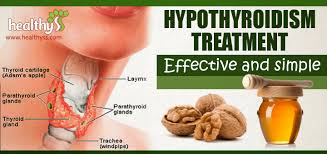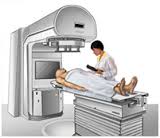 Treatment for hypothyroidism will depend almost exclusively upon the reason you are experiencing low levels of thyroid hormone. The diagnosis is made by measuring the amount of thyroid hormone using several different tests. There are normal ranges for all thyroid hormones which is then calculated and if the level falls below the normal range this is consistent with hypothyroidism. However, there are those individuals whose levels fall within the normal range but the amount of thyroid hormone available to the body is lower than what that individual requires. Even in these instances, the individual will be diagnosed with hypothyroidism or underactive thyroid.
Treatment for hypothyroidism will depend almost exclusively upon the reason you are experiencing low levels of thyroid hormone. The diagnosis is made by measuring the amount of thyroid hormone using several different tests. There are normal ranges for all thyroid hormones which is then calculated and if the level falls below the normal range this is consistent with hypothyroidism. However, there are those individuals whose levels fall within the normal range but the amount of thyroid hormone available to the body is lower than what that individual requires. Even in these instances, the individual will be diagnosed with hypothyroidism or underactive thyroid.
The easiest and most effective treatment for hypothyroidism is taking a hormone replacement once a day, preferably in the morning. This particular medication is a pure synthetic form of T4, and made in the laboratory. It (Levothyroxine) comes in multiple different strengths. This means that the amount of medication can be adjusted based on the individuals needs. This level should be recalculated at least annually to account for aging and changing lifestyle choices.
Some people don’t do as well as others on the thyroid medications and so individuals should not be shy about talking with their physician about any symptoms they may experience and the type of medication they are taking. The ultimate goal is to improve the way you feel, slow the risk of heart disease and osteoporosis as well as increase the length of your life.
Once an individual begins taking the medication it can take up to four to eight weeks before the full effect of the thyroid hormone therapy is experienced. It is important for the physician to continue to monitor the effects of the thyroid hormone on the individual. Too much medication and the individual may experience nervousness, palpitations or insomnia. Too little and the patient will continue to experience fatigue and the others symptoms which brought them to their physician in the first place.
There have been recent studies which show that too much thyroid hormone can increase the amount of calcium that is lost from the bones, placing the individual at higher risk for osteoporosis. For individuals who have a previously diagnosed heart condition, optimal medication adjustment is very important. Even a slight excess may increase the risk for heart attack or worsen chronic angina.
After a month of treatment blood levels will be monitored to establish the correct dose of thyroid hormone. This helps to prevent the possibility of either over or under dosing with the hormone. Once treatment has been started, it typically will continue for the rest of the patient’s life.
 If you have had radiation therapy, had the thyroid gland removed or suffer from primary hypothyroidism it is most likely you will continue to need treatment for the rest of your life. Those individuals who suffer from Hashimoto’s thyroiditis might also need treatment for the rest of their life, although, there are instances when individuals with Hashimoto’s will regain enough thyroid function to discontinue taking medication.
If you have had radiation therapy, had the thyroid gland removed or suffer from primary hypothyroidism it is most likely you will continue to need treatment for the rest of your life. Those individuals who suffer from Hashimoto’s thyroiditis might also need treatment for the rest of their life, although, there are instances when individuals with Hashimoto’s will regain enough thyroid function to discontinue taking medication.
There are medication interactions when using Levothyroxine which can place the individual in danger. Patients taking Cholestyramine to reduce their cholesterol, women who become pregnant, and those taking iron containing vitamins should all consult with their physician in order to ascertain whether or not the medication dosage should be adjusted based on the additional medication or stress to the body.
Some alternative medicine physicians believe that poor nutrition is the origin of many thyroid problems and that by improving the types and quality of foods you eat individuals may be able to reverse the effects, or at least prevent further decline. A healthy functioning thyroid gland is dependent upon a range of vitamins and minerals, including selenium, folic acid and iodine.
Other lifestyle choices which may impact the function of the thyroid, and therefore the amount of medication necessary to treat the condition, is exercise, decreasing stress, adequate sun exposure and other alternative methods such as acupuncture, naturopathic medicine, biofeedback and osteopathy.
No matter if the individual chooses traditional Western medicine therapies or alternative medicine therapies in order to treat their hypothyroidism, this condition is best approached using a multi-tiered treatment which deals directly with nutrition, stress related and emotionally related factors and exercise.
Resources:
MayoClinic: Hypothyroidism
http://www.mayoclinic.com/health/hypothyroidism/DS00353/DSECTION=treatments-and-drugs
MayoClinic: Hypothyroidism and Diet
http://www.mayoclinic.com/health/hypothyroidism-diet/AN01478
American Family Physician: Subclinical Hypothyroidism
http://www.aafp.org/afp/1998/0215/p776.html
Cleveland Clinic: Hypothyroidism and Hyperthyroidism
National Endocrine and Metabolic Diseases Information Service: Hypothyroidism
http://www.endocrine.niddk.nih.gov/pubs/hypothyroidism/


Leave a Reply